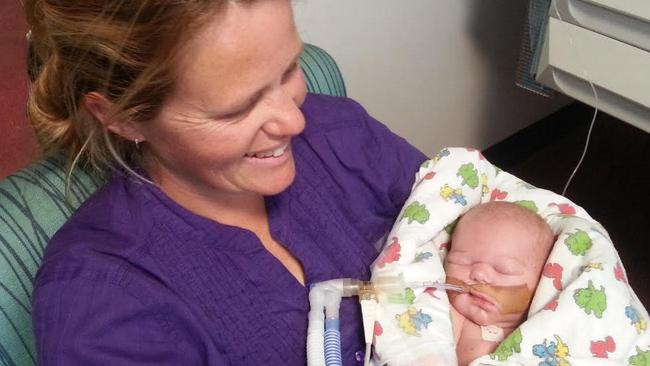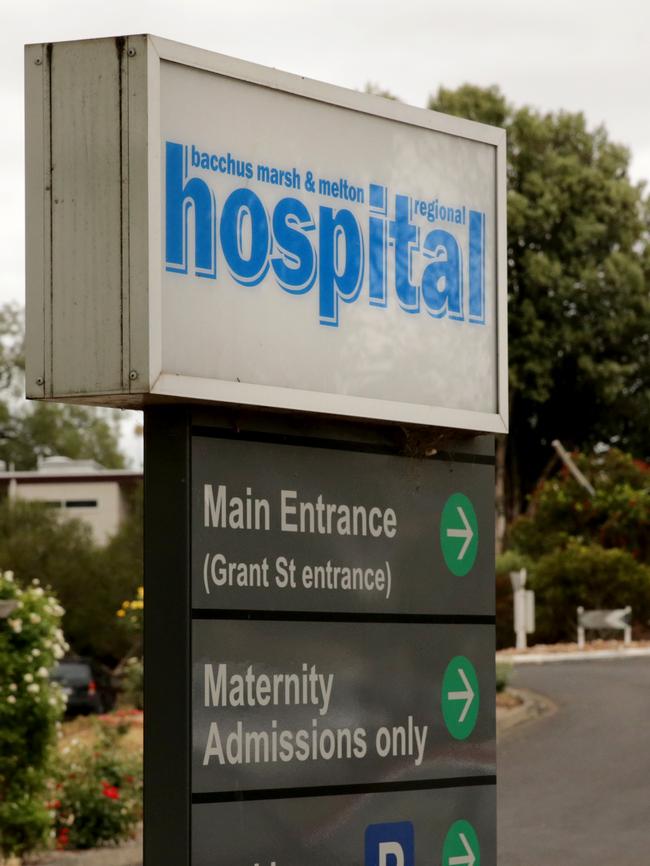Parents blast Bacchus Marsh Hospital over baby’s death
THE parents of one of 11 suspect baby deaths at Bacchus Marsh Hospital have revealed the tragic failings that allegedly led to the avoidable death of their newborn daughter.

VIC News
Don't miss out on the headlines from VIC News. Followed categories will be added to My News.
THE parents of one of 11 suspect baby deaths at Bacchus Marsh Hospital have revealed the tragic failings that allegedly led to the avoidable death of their newborn daughter.
Missed chances and a desperate battle to save the tot’s life after she was born floppy and barely breathing, if at all, is revealed in a writ filed in the County Court.
Phillipa Will, 42, and Phillip Voutier, 43, allege that if not for the negligence of the hospital’s specialist obstetricians and midwives their baby, Esther, would not have died.
“There is no way to describe the loss we have felt and will continue to feel,“ Ms Will told the Herald Sun.
“We know that our daughter would still be alive today if she had received the appropriate care — this is something we will never be able to forget. There was clearly a mistake made and it has resulted in a loss of life, which has created an unfillable hole in our lives.
“We think about her every day and what she would have done and achieved. Unfortunately we will never be able to watch her grow up and experience the joy she would have brought to our lives.
“We don’t want anyone else to have to go through what we have.”
Twenty-five minutes after little Esther was born with a dusky mottled appearance and an abnormally low blood pH level, she suffered seizures and was resuscitated by a GP, who practises in obstetrics, using a bag and mask for ventilation, chest compressions, suction, intubation and supplementary oxygen.

The tot was also administered a cocktail of drugs including adrenaline; “volume expander”, an intravenous therapy that provides greater volume for the circulatory system; anti-seizure mediactaions phenobarbitone, phenytoin and midazolam; and antibiotics penicillin and gentamycin.
But it is what happened before this, during Ms Will’s eight-hour labour that is central to the couple’s claim for unspecified damages.
Slater and Gordon Lawyer Lee Kimonides said it was an extremely tragic case of systemic failure.
“If appropriate medical care was provided and the baby was delivered in accordance with reasonable obstetric practice, Esther would be a three-year-old toddler living happily with her parents today,” she said.
“It is particularly devastating for Ms Will and Mr Voutier as they were initially told by the hospital that baby Esther’s death was unavoidable, only to discover three years later, that this was in fact wrong, and that Esther’s death was clearly preventable.”
Ms Will’s GP referred her to the Djerriwarrh Health run hospital in December, 2012 to manage her pregnancy and expected July 2013 birth.
Cardiotocographic monitoring on her final consultation a day before labour was scheduled to be induced showed her unborn baby was not in distress.
CTG monitoring measures the heart rate of mother and foetus, with a rate of between 120 and 160 beats per minute considered normal during labour in 2013. A faster heart rate is foetal tachycardia.
HERALD SUN INVESTIGATION: Bacchus Marsh baby toll soars
Couple sue Bacchus Marsh hospital over death of their baby
Two more families sue over alleged Bacchus Marsh pregnancy mishandling
Medicos quit as dozens called to answer allegations
The writ claims CTG monitoring during the next day’s labour was mismanaged and misinterpreted by the attending doctors and midwives.
It alleges five separate CTG readings showed the unborn child was in foetal distress with heart rates of up to 180 bpm.
Ms Wills arrived at the hospital at 2.20pm and 35 minutes later her waters spontaneously broke, with the amniotic fluid containing foetal faecal matter, or meconium. By 10.20pm Ms Wells was entering the final stage of labour.
CTG monitoring over this period revealed the foetal heart rate was 165 bpm at 9pm; between 165 and 180 at 9.20pm; 170 at 9.30; and 175 at 10pm.
Fifteen minutes later the unborn baby’s heart rate was between 170 and 180 with reduced beat-to-beat variability to an abnormal level of below five beats per minute.
The couple’s claim alleges reasonable practise required the midwives be able to accurately interpret CTG monitoring and to promptly report abnormal results to the treating doctor.
The writ alleges this did not occur until 10.15pm, with the delivering doctor attending 15 minutes later when he made a note of the heavily meconium stained amniotic fluid before delivering the baby with the help of a vacuum extractor at 11.14pm, again noting heavy meconium presence with delivery.
Despite the efforts to save Esther, she suffered severe hypoxic ischaemic encephalopathy — brain damage caused by oxygen loss — and the following day she was transferred to the Mercy Hospital for Women’s neonatal intensive care unit where she died six days later after her mum and dad made the heartbreaking decision to turn off their daughter’s life support.
Esther died from brain damage and Group B Streptococcus, bacteria that normally lives in our bodies but which can cause serious illness and even death in newborn babies.
Esther’s placenta was found to have signs of acute chorioamnionitis, an inflammation caused by bacterial infection often associated with prolonged labour, and Group B Streptococcus.
A later investigation by Professor Euan Wallace found there was “a significant delay in effecting delivery due to misinterpretation and mismanagement of the CTG for several hours prior to birth”.
“Resuscitation was undertaken by GP obstetrics with no availability of paediatrics,” the Wallace report says. “This was an avoidable loss. The hospital’s Clinical Review found no fault. This was an incorrect finding.”
The parents, who were present throughout the labour, delivery and resuscitation, say they were informed that their daughter’s death was preventable in October, 2015.
They claim Esther would not have died or suffered brain damage if she had been delivered by 10pm.
The writ claims the hospital failed in its duty of care and breached its agreement with the parents by failing to accurately interpret the CTG monitoring and report the results to the treating doctor and failing to deliver within an hour of the onset of their baby’s abnormal foetal heart rate.
Both are seeking compensation for the loss of their daughter and psychiatric injury in the form of persistent complex bereavement disorder and ongoing treatment.
“This was a devastating blow to Ms Will and Mr Voutier, both of whom are forced to endure the heartache of knowing that their baby daughter should be with them now,” Ms Kimonides said.


